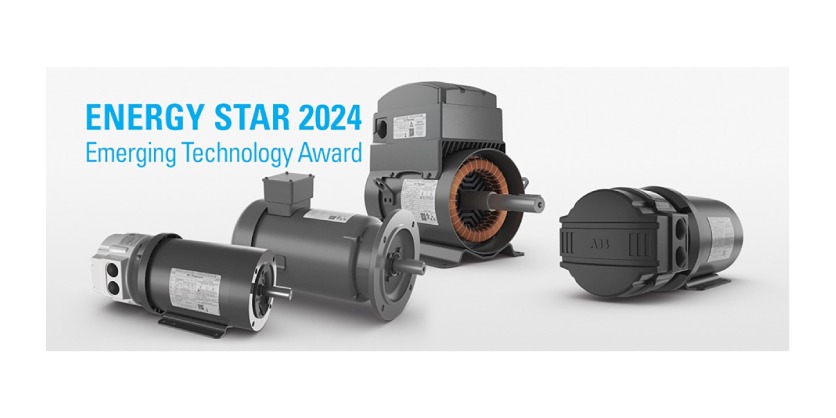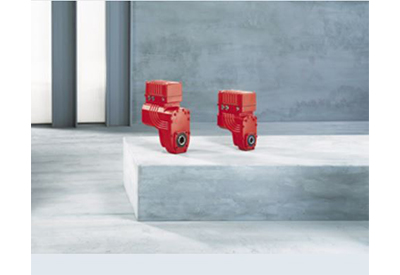ABB Baldor-Reliance EC Titanium Motors Earn ENERGY STAR Emerging Technology Award
July 22, 2024

The ABB Baldor-Reliance EC Titanium motor has been recognized with the U.S. Environmental Protection Agency’s 2024 ENERGY STAR Emerging Technology Award. This annual award recognizes products that meet stringent performance criteria in specific categories. By highlighting innovative solutions with the potential to significantly reduce greenhouse gas emissions, the award promotes promising technologies that may not yet fully align with the ENERGY STAR certification requirements or may be relatively more complex to properly install and operate.
The EPA’s efforts to raise awareness about these products contribute to increased demand, potentially reducing costs and expanding availability. EC Titanium has received the Emerging Technology Award in the category of commercial HVAC electric motors. Thirteen EC Titanium models, from 7.5 to 20 HP (5.5 to 15 kW) meet the technical requirements for the award.
EC Titanium is a highly efficient motor that combines synchronous reluctance and permanent magnet technologies. The rotor design incorporates non-rare earth elements, resulting in a motor solution that is highly efficient, quiet, reliable and easy to operate – all in an eco-friendly package. The EC Titanium motor is designed to be paired with a variable speed drive and is optimized for energy management and sustainability and ideal for fans, pumps, blowers, compressors, vacuum pumps, HVAC systems and other variable speed applications.
Available as a motor only or integrated motor drive (IMD) unit, EC Titanium provides excellent performance across a wide speed load range and above base speed conditions.
Forty-five percent of the world’s electricity is used to power electric motors used in buildings and industrial applications.1 By 2030, this cost is projected to reach $900 billion annually.2 This significant energy demand presents a substantial opportunity for efficiency improvements, contingent upon favorable market conditions and advancements in motor technologies. In response to a call for product category nominations, the EPA received a proposal to recognize electric motors that adhere to the International Electrotechnical Commission’s (IEC) IE5 efficiency level, currently the IEC’s most stringent efficiency performance standard.*
In addition to energy savings from increased efficiency, there are other technology improvements associated with IE5 motors that offer advantages to users that could help speed adoption of this technology, such as quieter operation, lower operating temperature and longer equipment life.
Additional EC Titanium benefits:
- Improved partial load efficiencies as compared to NEMA Premium® (IE3) efficiency motors
- Over-speed constant power operational range to 4,000 RPM
- High power factor reduces motor full-load amps and allows for a smaller drive to be used
- Lower current draw and smaller power converter
- Power-dense, drop-in-replacement NEMA frames
- Shaft grounding brush for extended bearing life
- Class F insulation with Class B rise decreases motor thermal stress and increases motor life
- IP54 motor enclosure with shaft seal 5 service factor design
- For inverter use only per NEMA MG 1 Part 31.4.4.2
* IEC energy efficiency ratings are recognized in Europe but also in North America by the National Electrical Manufacturers Association (NEMA) and the Consortium for Energy Efficiency.
1] ABB, 2021. Achieving the Paris Agreement – The vital role of high-efficiency motors and drives in reducing energy consumption
2] ETC, 2021. Making Clean Electrification Possible: 30 Years to Electrify the Global Economy
ABB is a technology leader in electrification and automation, enabling a more sustainable and resource-efficient future. The company’s solutions connect engineering know-how and software to optimize how things are manufactured, moved, powered and operated. Building on more than 140 years of excellence, ABB’s more than 105,000 employees are committed to driving innovations that accelerate industrial transformation.
ABB Motion, a global leader in motors and drives, is at the core of accelerating a more productive and sustainable future. We innovate and push the boundaries of technology to contribute to energy-efficient, decarbonizing and circular solutions for customers, industries and societies. With our digitally enabled drives, motors and services, we support our customers and partners to achieve better performance, safety and reliability. We deliver motor driven solutions for a wide range of applications in all industrial segments. Building on more than 140 years of domain expertise in electric powertrains, our more than 22,000 employees across 100 countries learn and improve every day. go.abb/motion
Related Story
Ultra-Efficient, Baldor-Reliance® EC Titanium™ Motors
ABB has added IEC frame options to its integrated motor-drive offering of Baldor-Reliance EC Titanium motors. Standard features include aluminum housed top-mount of axial mount integrated drive, IP55 enclosure, internal shaft grounding brush and class-F insulation. EC Titanium motors are rated for inverter use per IEC 60034-18-41. The IEC integrated motor-drive is capable of operating as a top-mount drive in ratings of 1 to 10 HP (0.75 – 7.5 kW), or axial-mount drive in ratings 1 to 7.5 HP (0.75 – 5.5 kW).





